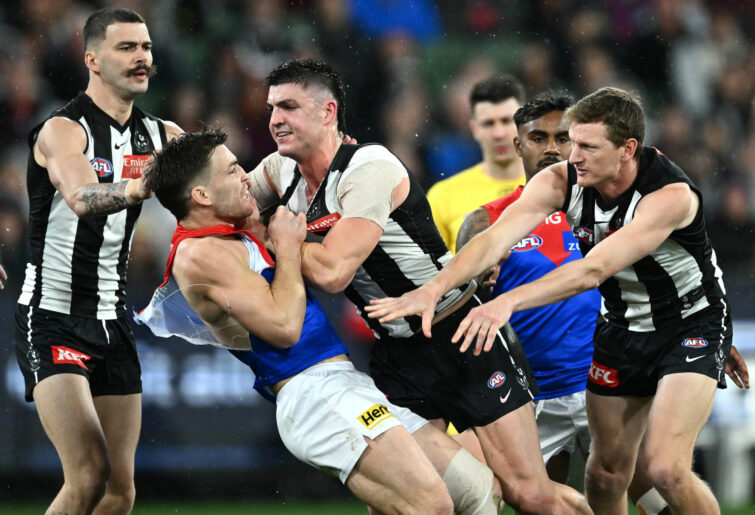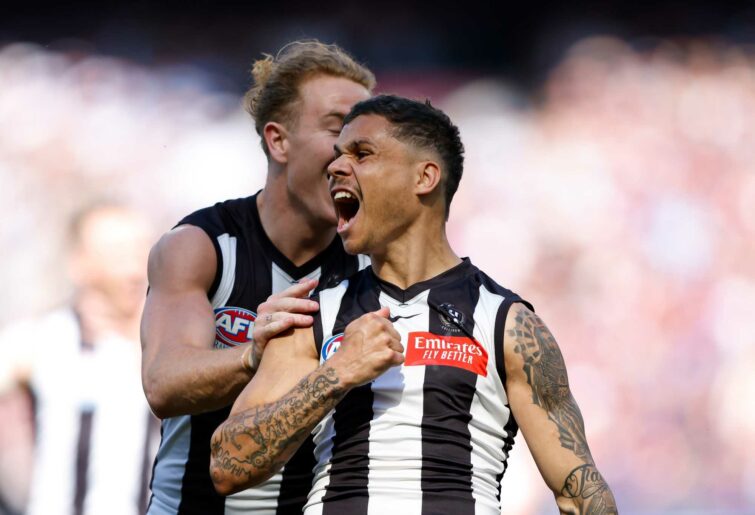AFL News: North OF Melbourne? McGuire's bold idea to rejuvenate Roos, Scott slams sub rule after Anzac Day drama
Eddie McGuire's latest bold idea has dropped - for North Melbourne to take over the outskirts of Melbourne and use it to rejuvenate the…
One week on has given me time to reflect on such an improbable flag for the Pies.
“Improbable?” I’m sure some would scoff, before pointing out that Collingwood finished minor premiers, and sat on top for the bulk of the season. Yes. Improbable.
What does finishing on top really mean?
In 2011, Collingwood finished minor premiers with a 20-2 record, only to see a powerful Geelong overrun a club that had begun to unravel by the end of the season under the weight of the well-intentioned but misguided succession plan.
Collingwood finished wooden spooners in 1976, then charged to the top in 1977. The loss of their star centre-half forward, Phil Carman, to suspension is often mooted as one of the reasons Collingwood lost to North Melbourne in the grand final replay.
In 1973, Collingwood finished two games clear on top, then lost both finals – the second against Richmond, the preliminary final, after leading by 46 points in the second quarter.
Collingwood’s finished on top before. It doesn’t necessarily guarantee a flag, nor even suggest favouritism. Worse, the club latch onto issues, allowing them to grow into distractions that become so problematic they eventually evolve into excuses. Many of these – like the Carman suspension, the Wayne Harmes tap in 1979, the Anthony Rocca point in 2002 – have become mythic, with people (including former Collingwood president Eddie McGuire) still perpetuating them today.
Collingwood had potential distractions and excuses in the 2023 finals – the uproar following the Brayden Maynard collision with Angus Brayshaw; vice-captain Taylor Adams’ hamstring; Daniel McStay’s knee being injured in the preliminary final; and then, in the actual grand final itself, losing important defender Nathan Murphy deep in the first quarter.

Brayden Maynard. (Photo by Quinn Rooney/Getty Images)
Then there’s the margin: 4 points. Collingwood doesn’t win close grand finals. Melbourne beat them by 4 points in 1964, St Kilda by 1 in 1966, Carlton by 10 in 1970, Carlton by 5 in 1979, then by 20 in 1981 (after Collingwood led at three-quarter time), Brisbane by 9 in 2002, and then West Coast by 5 in 2018.
In fact, the only other time Collingwood’s won a flag by less than a kick is against Fitzroy in 1903, emerging victorious by 2 points.
There is a surrealness about overcoming Brisbane last week – it’s the victory I’ve waited for my whole supporting life. Each time Collingwood has launched another flag salvo – from the New Magpies administration in 1983 to the drought-breaking flag in 1990, to Collingwood’s unlikely ascension from wooden spooners in 1999 to grand finalists in 2002, to the win in 2010, and then Nathan Buckley’s belated shot at glory in 2018 – I’ve thought this club could become something greater than what it is; that it can rewrite the narrative that’s become its story.
It hasn’t occurred, which has left the occasional glory and prevailing misery.
This is an argument I have with many fans: they keep telling me what a “great” club Collingwood is. I disagree. We’re a club who’s great simply for existing, but that’s largely built on history.
Collingwood won 11 of their flags in the first 44 years of their existence. In the next 87 years, they’ve won only five more. Since 1958, they’d won only two more until Saturday.
It’s a better record than a club like St Kilda’s – that’s what many say to me. Okay. Yes, they’re right. But in that same time, Hawthorn’s won 13 flags. Surely you aspire to be the best, rather than compare with somebody lesser to pump yourself up.
Some will counter that it means more just being there regularly, regardless of the outcomes. I don’t know that I can agree with that.
If I cast my mind back to the 1980s, I can tell you the list of premiers in that decade in order: Richmond, Carlton, Carlton, Hawthorn, Essendon, Essendon, Hawthorn, Carlton, Hawthorn. I can tell you who they defeated.
I won’t be able to tell you all the finalists those years, or the profits those clubs made, or their membership tallies, or what their training facilities looked like, or any of those material assertions. These are reasons people keep telling me Collingwood’s great, but they’re ephemeral. Flags are what clubs play for. Flags are what’s recorded for posterity. Give me a spate of flags and twenty years of mediocrity over twenty years of contending without winning one.
Because that’s what sport’s about: the ultimate. We know who Novak Djokovic is, we know who Muhammad Ali is, we know about Australia’s dominance in cricket under Mark Taylor, Steve Waugh, and Ricky Ponting. We know about the West Indies’ supremacy in the 1980s under Clive Lloyd, then Viv Richards. We know about Michael Jordan and the Chicago Bulls. But do you recall who ALMOST won? Or who didn’t even get close? As much as we try to massage it, sport is about winning.
Last Saturday, as the game marched to its inevitable end, it felt like this could yet again be another heartbreaker. Coach Craig McRae’s mantra the whole season has been, “play the minutes.” Collingwood went from surrendering the lead with just five minutes remaining – that usually would’ve been meltdown material – to regaining it immediately, then extending it.
Whereas in the dying minutes of the 2018 Grand Final against West Coast they looked like didn’t know how to close out the game, last week they changed their intent depending on what was needed – to win it or defend it.
Some will counter that Collingwood were lucky, or, as the saltiest of opposition supporters have suggested, that umpires hauled them over the line courtesy of that bad call late in the game: Oleg Markov legged Lachie Neale for a free; Neale fired out a handball to Zac Bailey, who snapped the ball forward – the umpire paid advantage, whereas he should’ve called it back.
The free kick WAS there. And it definitely should’ve been called back, as Bailey was operating on instinct, rather than a conscious decision that he was going to try to take the advantage. It WAS a bad call. But, so?
What about Zac Bailey being in the protected zone in the first quarter when Mason Cox was called to play on? That allowed Bailey to take a single step and smother Cox’s kick. (perhaps karma came calling later for Bailey.) Daniher gathered the ball, fired it back to Bailey, who goaled.
What about the terrible 50-metre penalty paid against Oleg Markov on Hugh McCluggage on the wing? McCluggage was marched to inside forward 50 and goaled.
What about the umpire opening the final quarter with a terrible bounce that skewed back over Cox’s head, and then calling Cox for blocking when the block was purely a result of the terrible bounce?
This is not to say Collingwood had the rougher end of the umpiring – Brisbane also got some shockers, such as Mason Cox being tackled right in front of Brisbane’s goal in the first quarter and throwing the ball. But this is the point: there were plenty of bad decisions – umpiring this year has been terrible (and many in the media are publicly acknowledging it, which tells you something) – so to try to dilute the game to just the one bad decision is wrong.
It’s why I’ve never bought into the Brayden Maynard block in 2018 – yep, it definitely was a block. But Collingwood failed to take a plethora of other chances to win that game. West Coast were too good for Collingwood, just as Collingwood were too good for Brisbane.
Still, this one call has now exploded into another glorious fable – the sort Collingwood usually propagate and, ultimately, revere, until it abrogates them of all responsibility for losing. Now they’re on the other side of the equation.
For Collingwood to defeat Brisbane in such a close game with all the circumstances that usually would potentially spool into distractions, it gives me hope that this incarnation of the Pies can become that something more that I’ve always wanted from the club. Hawthorn’s done it. Geelong’s done it. Can Collingwood?

Bobby Hill. (Photo by Dylan Burns/AFL Photos via Getty Images)
Collingwood’s only other two flags in the modern era – games won by big margins – have led to the club imploding: following 1990, they partied for too hard, for too long, while the administration lost its focus; and following 2010, the club self-sabotaged itself with the absurd succession plan, which Eddie McGuire still defends to this day with the vigour of a drunk denying he has a drinking problem.
Collingwood’s list isn’t exactly built to extend into some great dynasty. They’ll lose important players over the next couple of years to retirement, and queries remain on the young guns who, to this point, have functioned predominantly as VFL footballers.
There’s no immediate access to top-end draft picks, and not a lot of trade collateral. We still don’t know the shape of their cap or if it’s under control.
It would be easy for this flag to be the outlier. But with such an amazing victory, such an unCollingwood triumph, it will be interesting to see how the club bear it into the future.